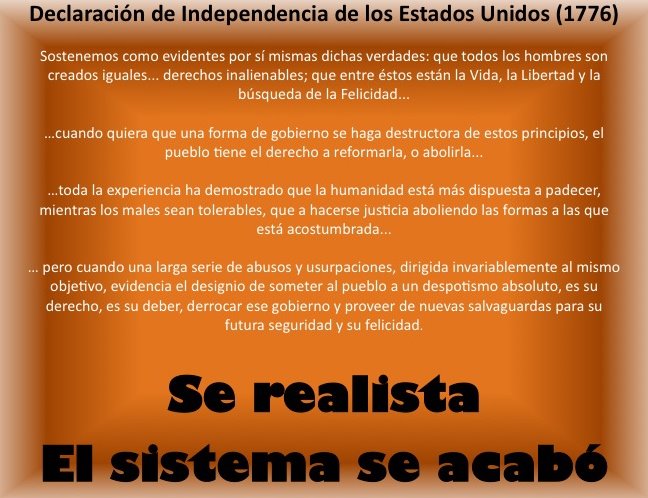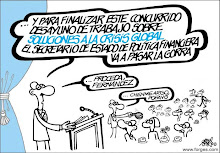viernes, 13 de febrero de 2009
El plan de Bernake
Ben S. Bernake, actual presidente de la Reserva Federal (Banco Central) de los Estados Unidos, escribió este artículo sobre la "deflación" y sus consecuencias hace más de seis años... No hace falta tener amplios conocimientos de economía (ni siquiera ser muy despierto) para darse cuenta de que la única estrategía que tienen para sacarnos de este lio es inyectar líquidez dándole a la "imprenta de hacer dinero" (hablando en términos figurados)... Este es uno de los motivos por los que somos tan persistentes en nuestra creencia de que para verano del próximo año estaremos hablando de cifras de inflación de dos dígitos... el tiempo dará o quitará razones...
"As I have mentioned, some observers have concluded that when the central bank's policy rate falls to zero--its practical minimum--monetary policy loses its ability to further stimulate aggregate demand and the economy. At a broad conceptual level, and in my view in practice as well, this conclusion is clearly mistaken. Indeed, under a fiat (that is, paper) money system, a government (in practice, the central bank in cooperation with other agencies) should always be able to generate increased nominal spending and inflation, even when the short-term nominal interest rate is at zero.
What has this got to do with monetary policy? Like gold, U.S. dollars have value only to the extent that they are strictly limited in supply. But the U.S. government has a technology, called a printing press (or, today, its electronic equivalent), that allows it to produce as many U.S. dollars as it wishes at essentially no cost. By increasing the number of U.S. dollars in circulation, or even by credibly threatening to do so, the U.S. government can also reduce the value of a dollar in terms of goods and services, which is equivalent to raising the prices in dollars of those goods and services. We conclude that, under a paper-money system, a determined government can always generate higher spending and hence positive inflation. "
Traducción de los párrafos en negrita:
"El Gobierno norteamericano tiene una tecnología, llamada imprenta (o su equivalente electrónica), que permite producir tantos dólares como se deseen sin coste alguno. (...) Bajo un sistema monetario fiduciario, un determinado gobierno puede siempre generar mayor gasto y, por tanto, inflación positiva."
"Of course, the U.S. government is not going to print money and distribute it willy-nilly (although as we will see later, there are practical policies that approximate this behavior). Normally, money is injected into the economy through asset purchases by the Federal Reserve. To stimulate aggregate spending when short-term interest rates have reached zero, the Fed must expand the scale of its asset purchases or, possibly, expand the menu of assets that it buys. Alternatively, the Fed could find other ways of injecting money into the system--for example, by making low-interest-rate loans to banks or cooperating with the fiscal authorities. Each method of adding money to the economy has advantages and drawbacks, both technical and economic. One important concern in practice is that calibrating the economic effects of nonstandard means of injecting money may be difficult, given our relative lack of experience with such policies. Thus, as I have stressed already, prevention of deflation remains preferable to having to cure it. If we do fall into deflation, however, we can take comfort that the logic of the printing press example must assert itself, and sufficient injections of money will ultimately always reverse a deflation."
Luego, más adelante en ese mismo documento se afirma que "Si el Tesoro emite deuda para comprar activos privados y la Fed compra por el mismo importe la deuda emitida por el Tesoro con dinero recién creado, la operación completa equivaldría a una operación de mercado abierto en activos privados."
Etiquetas:
Concienciación,
Crisis,
Sistema
La caida del Imperio Anglo (I)
Y a nosotros tampoco es que nos vaya mucho mejor
Etiquetas:
Concienciación,
Crisis,
La Caida del Imperio Anglo,
Sistema
"Economía Canalla" de Loretta Napoleoni
“Nadie, ni los gobiernos, ni los mercados, ni los economistas ni los políticos saben de verdad qué hacer” (Loretta Napoleoni).
Etiquetas:
Concienciación,
Crisis,
Sistema,
Sociedad
Para que veaís que no nos inventamos nada
Cuando decimos que, no ya las cajas, sino todas las entidades financieras están que-bra-das
El Banco de España exige al PSOE una solución urgente para no intervenir Caja Castilla La Mancha
Etiquetas:
Concienciación,
Crisis,
Sistema
Suscribirse a:
Comentarios (Atom)





























